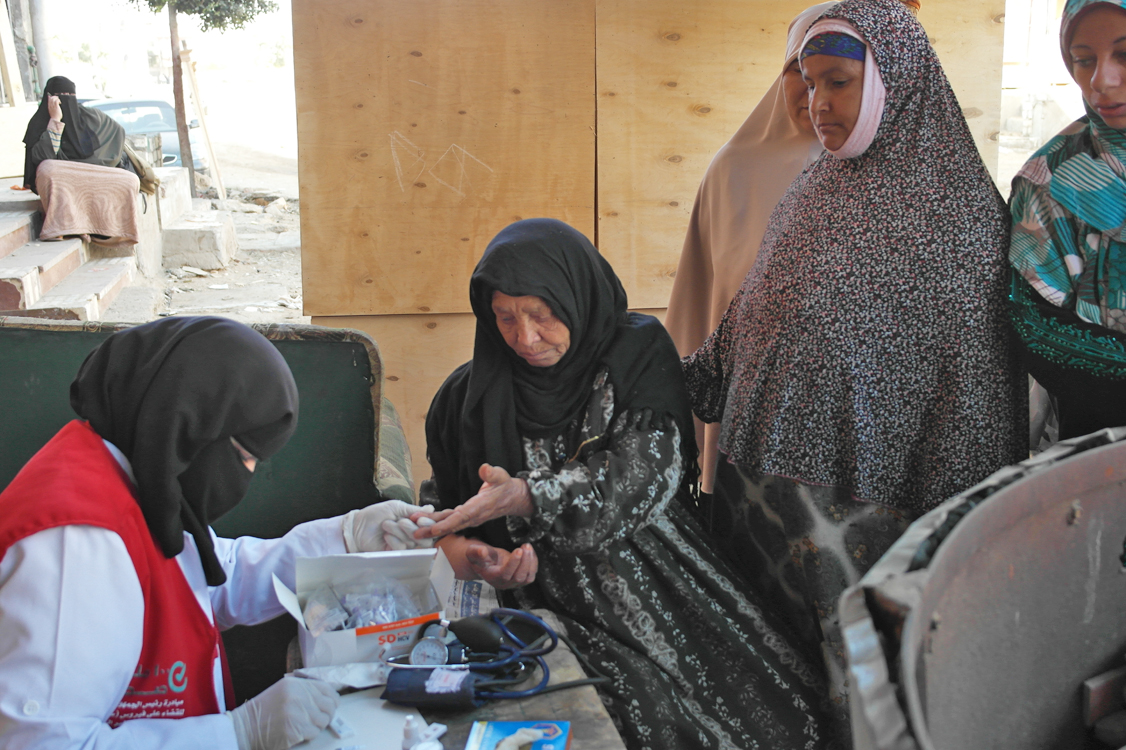Having lost her husband to hepatitis C, Amal* understands how devastating hepatitis C can be. Amal herself was subsequently diagnosed with hepatitis C after attending a local screening. Later, her 23-year-old relative also discovered she had the disease.
“I’m happy that I discovered my illness early, and that I get free treatment and follow-up services from the government. The mass screening and community-based campaigns have made a huge difference,” said Amal.
WHO’s global hepatitis strategy, endorsed by all WHO Member States, aims to reduce new hepatitis infections by 90% and deaths by 65% between 2016 and 2030.
A long history of ambitious government action
Egypt had one of the highest rates of viral hepatitis in the world. Between the 1950s and 1980s, inadvertent infection transmission associated with unsafe injection practices occurred in the attempt to control schistosomiasis, a parasitic disease carried by water snails. Over 6 million Egyptians were infected with hepatitis C in this way. Thanks to years of coordinated government action, the country is now on the path to eliminate the disease. This is a remarkable transformation.
From the early 1990s until now, the government has put vast effort into strengthening hepatitis prevention with programmes covering blood safety, infection control and injection safety. It also worked on raising public awareness and running harm reduction programmes. By 2015, 5.5 million people were estimated to be chronically infected. Motivated by a strong and ambitious aim to eliminate hepatitis C entirely, the government took action.
Introducing free testing and treatment for all
Egypt launched a network of specialized treatment centres in 2006, and with the new anti-viral medicines discovered in 2014, hepatitis testing and treatment were made accessible and free of charge for everyone. The approach followed WHO’s hepatitis treatment guidelines, which highlight the risks of untreated disease and advocate for testing and treatment.

© Noha El Qareh/WHO Egypt
In 2018, the government decided to implement a massive and unprecedented nationwide campaign, to detect and treat everyone with hepatitis C, escalating its elimination efforts. Years of work crystallized into the 100 Million Healthy Lives Campaign, which continues to this day.
Through the campaign, everyone over 18 was tested, later expanding to children 12 years and older. In addition to routine testing at all healthcare facilities, the campaign employed outreach in the community, with teams visiting big squares, markets, workplaces, sports clubs, mosques and churches, and popular meeting places such as barbershops. Vulnerable communities such as refugees and migrants, and persons with disabilities were also included, in order to leave no one behind.
The campaign was successful in reaching and testing over 60 million people with WHO-approved rapid diagnostic tests. During the campaign, 2.2 million people tested positive for hepatitis C antibodies and those with chronic hepatitis C received treatment. Patients were also assessed and treated for other chronic diseases, such as hypertension and diabetes. Since the campaign was launched, the hepatitis C cure rate in Egypt has exceeded 98%.
Continued WHO and government collaboration and commitment to eliminate hepatitis
“Viral hepatitis causes thousands of deaths each year. The Ministry of Health and Population is committed to eliminating hepatitis C from our country and we are optimistic for the future of health for all,” said Professor Khaled Abdel Ghaffar, Minister of Health and Population of Egypt.
WHO provided technical support to the Ministry of Health and Population to set up and implement the campaign. WHO also acted as an independent verification agency, visiting screening sites nationwide and conducting extensive patient surveys, to ensure compliance with WHO guidelines and good quality services.
“Working closely with the Ministry of Health and Population and other partners ensures that people living with hepatitis C in Egypt are aware of their status and linked to treatment free of charge. This is a real step towards achieving universal health coverage,’’ said Dr Naeema Al Gasseer, WHO Representative to Egypt.
*Names and ages changed for privacy reasons.
